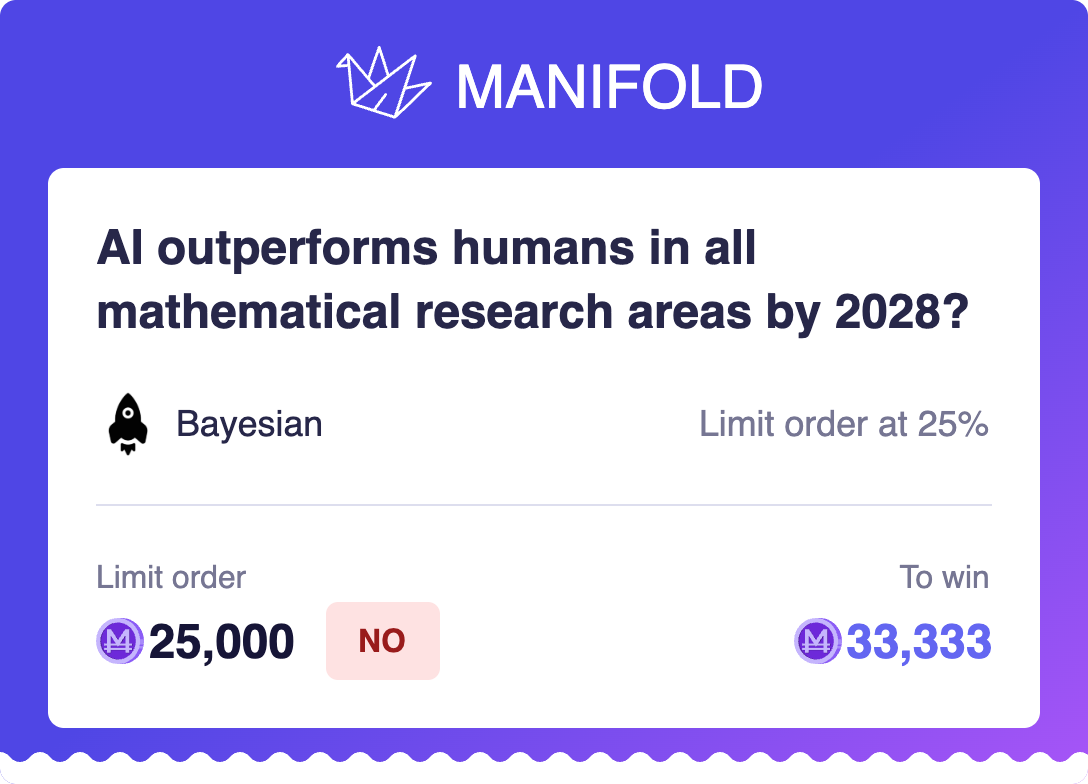Will I believe, 3 years from today, that publicly available AI tools have absolute advantage over human mathematicians in all areas of mathematical research?
I will not participate in this market.
Some background--I'm a math professor at the University of Toronto, mostly focusing on algebraic geometry and number theory.
I will resolve this market YES if I think publicly available AI tools outperform most professional mathematicians (e.g. me) as of July 17, 2028, and NO otherwise. In particular, for a YES resolution, they should be able to create high-quality original research with very little human input.
See here for a related market, with a more precise operationalization of a related question, albeit with some minor problems as a proxy: https://manifold.markets/TamayBesiroglu/will-ai-be-capable-of-producing-ann
Update 2025-07-17 (PST) (AI summary of creator comment): The creator has specified that for a YES resolution, the AI must outperform humans in all areas of math research, which explicitly includes:
Creating definitions
Making conjectures
Update 2025-08-09 (PST) (AI summary of creator comment): - If the creator is unreachable at resolution time, the market should resolve to N/A.
@DanielLittQCSn would you consider rephrasing the description slightly? it talks about outperforming humans in all mathematical research areas by 2028, but then this paragraph specifically makes the requirement for a yes resolution sound much weaker:
I will resolve this market YES if I think publicly available AI tools outperform most professional mathematicians (e.g. me) as of July 17, 2028, and NO otherwise. In particular, for a YES resolution, they should be able to create high-quality original research with very little human input.
I find it plausible that AI tools outperform most professional mathematicians on average or in terms of net utility or wtv but they are worse at many specific things. Also, that they can create high-quality original research in most domains but struggle in some niche domains that eg require some sufficient level of continual learning (like where you need to have spent many hundreds of hours competitively playing in a game to understand or think of a certain math-related dynamic) or good long term multimodal perception. Assuming that in those cases the market resolves NO (but lmk if that's not the case), I think this paragraph might be misleading? basically to rephrase, the vibe i get from the first sentence vs 4th parapragh seems pretty discordant
@Bayesian when I say “outperform” I mean in all areas, including domains requiring continual learning etc. I.e. if there is any math research capability I have that I do not think can be elicited from a publicly available AI tool the market resolves NO. Does this agree with your understanding?
@JoshSnider Be assured that if I see a swarm of nanobots approaching, turning everything in their path into paperclips, I will resolve the market YES.
@DanielLittQCSn a swarm of nanobots approaching turning everything in their path into proofs of the Riemann hypothesis
@JoshuaTindall We will know whether P = NP by measuring how much of the world AI has to turn into data centers before it knows how to put oranges in a box.
Are you considering only the task of proving theorems, or also that of building theories and conjectures? In my opinion, while it's possible for a system like AlphaProof to become superhuman at proving theorems by 2028 (though it would be very difficult), I believe such systems are still very far from being able to create definitions, make conjectures, and build theories.
@Grothenfla The question is about "all areas of math research." This includes creating definitions, making conjectures, etc.
